Workshops

(18th and 23rd December 2021)
Network pharmacology approach has many applications in drug discovery and repurposing. It attempts to predict drug action through interactions with multiple targets using computational methods on available data. The mechanistic plausibility of natural products used in traditional medicine systems like Ayurveda can be explored using the network pharmacology approach.
The workshop was held in two different sessions. An online session introduced network pharmacology followed by data collection from databases. Participants were given a few days to work on their data before joining an on-site session on data management and network construction. The objective of the workshop was to introduce biological databases and their applications to AYUSH researchers and to develop capacity building of AYUSH researchers in network pharmacology.
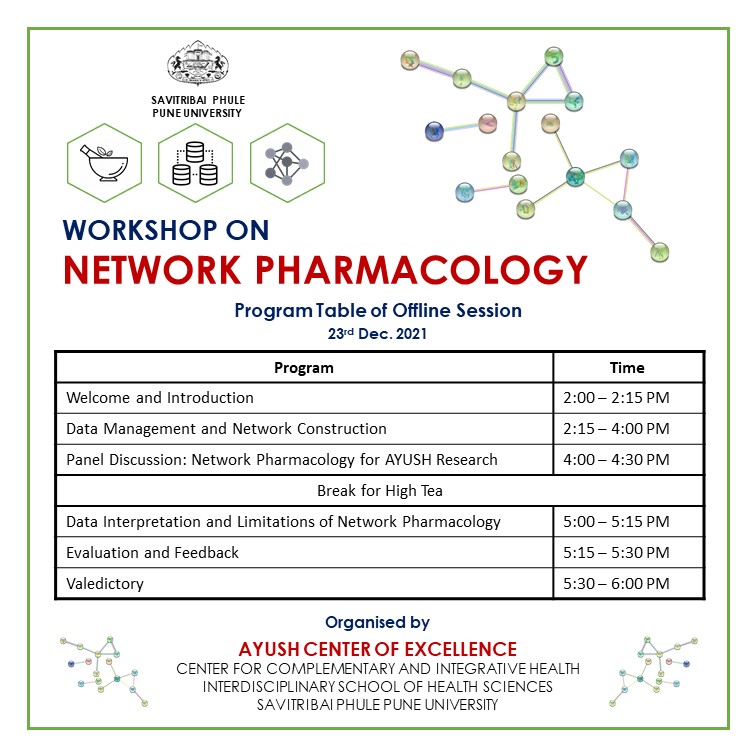
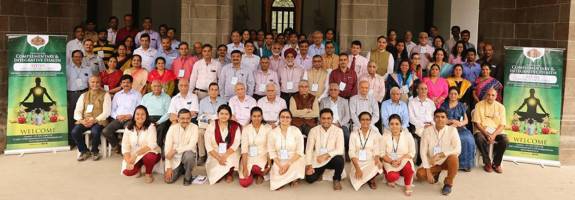
(30th August 2021)
The COVID-19 pandemic has brought all the medicinal systems to the same playfield. Physiological immunity has a special role to play in the pathophysiology of COVID-19. The modern medicine system is managing COVID-19 based on empirical approaches to manage infectious diseases. Whereas, Ayurveda focuses on strengthening the physiological immunity to fight against infectious agents.
There has been a significant contribution of Ayurveda in the management of COVID-19. The AYUSH Center of Excellence in collaboration with Jignasa Maharashtra and Maharashtra University of Health Sciences organized a virtual hybrid conference on the theme of contribution of Ayurveda in COVID-19 pandemic. The objectives were to disseminate the Ayurveda contribution in COVID-19 pandemic and to establish a network of Ayurveda researchers working in COVID-19.
(19th February 2020)
The term “Synergy” is derived from the Greek term ‘synergia’ which refers to ‘working together’ in literal meaning. However, in Science it refers to a nonlinear additive effect in the output of two systems working together. Likewise, in medicine synergism is associated with enhancement of the efficacy of two drugs upon a combinatory application in contrast to individual application. Diving into this concept, this workshop was aimed at enhancing the collective scientific efforts by bringing the scientists together and sharing their knowledge on a common platform, thus building a synergistic scientific environment. The objective of the workshop was to facilitate a brainstorming for research ideas and to develop a collaborative network.
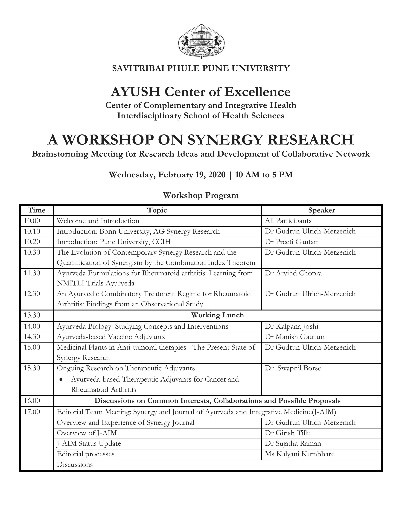
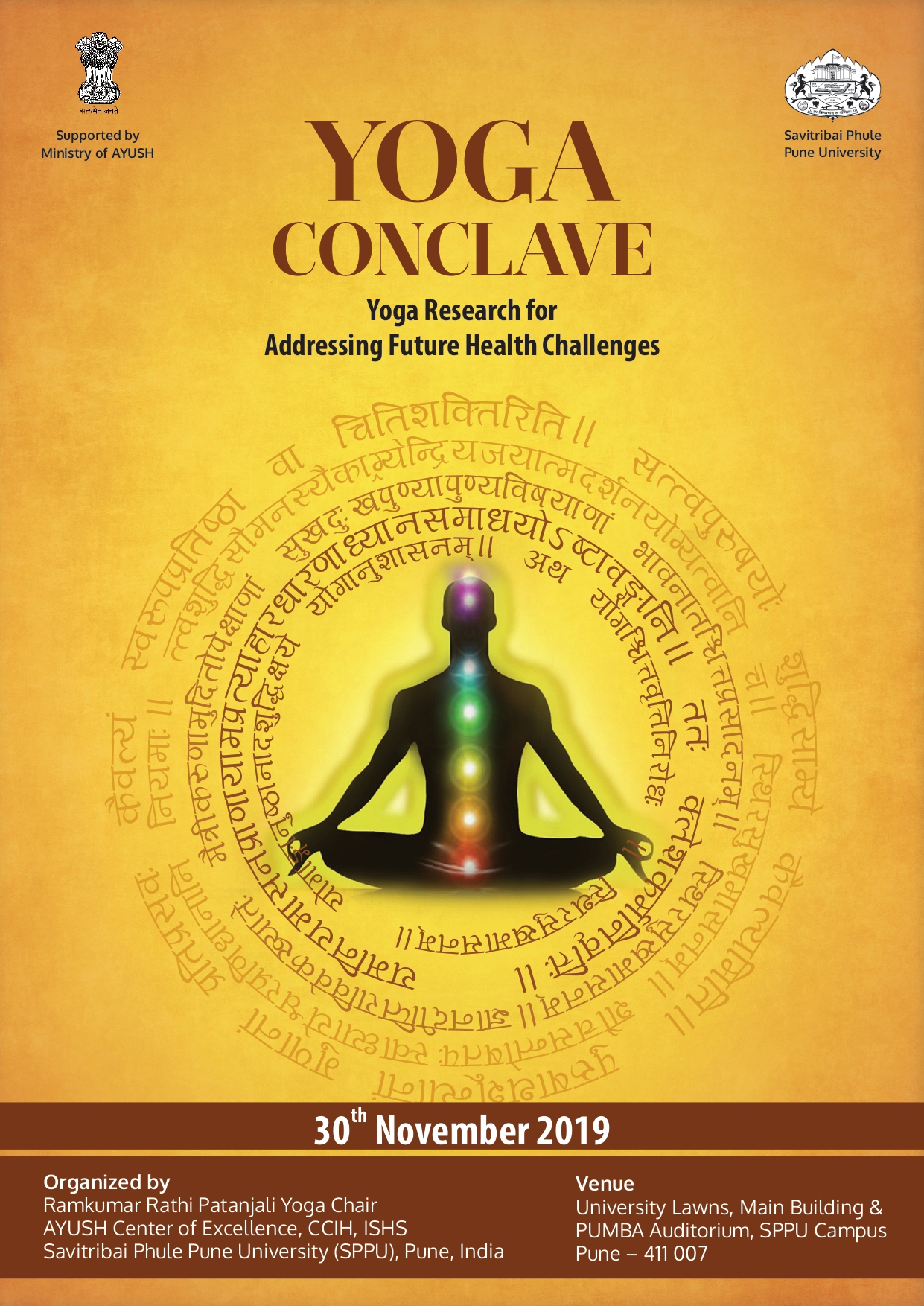
(30th November 2019)
The conference aimed to address the needs of Yoga research and provide opportunities for interactions with researchers and experts. The conclave was focused on exploring Yoga for health promotion, strengthening connections with Ayurveda, understanding the biology of Yoga, and developing epistemologically sensitive approaches for Yoga research.
The workshop contained informative sessions on different topics like opportunities for interaction with Yoga researchers, case studies on transdisciplinary Yoga research, a wide overview of Yoga applications in health promotion and disease management, opportunities for networking and collaborations. A practical session with Yoga Gurus was held to improve concentration and instill calmness.
(8th -10th July 2019)
Natural products have immense potential for drug discovery because of their rich phytochemistry. The understanding of the complex interactions between a plethora of chemical moieties and a number of biological targets needs computational methods.
In silico pharmacological methods have facilitated the understanding of drug and disease targets and helped to speed up the drug discovery and development process. AYUSH systems have a lot to offer for addressing healthcare challenges. In silico methods include data mining, quantitative structure-activity relationships, pharmacophores, molecular modelling, machine learning, and network-data analysis tools. In silico approaches have the potential to explore, identify, and repurpose the natural compounds from traditional systems for addressing unmet medical needs thereby promoting multi-target drug discovery.
The workshop was useful for faculty and students working in the area of AYUSH research and pharmaceutical sciences. The sessions included hands on activities, case studies, panel discussion, software training and interactions with experts.
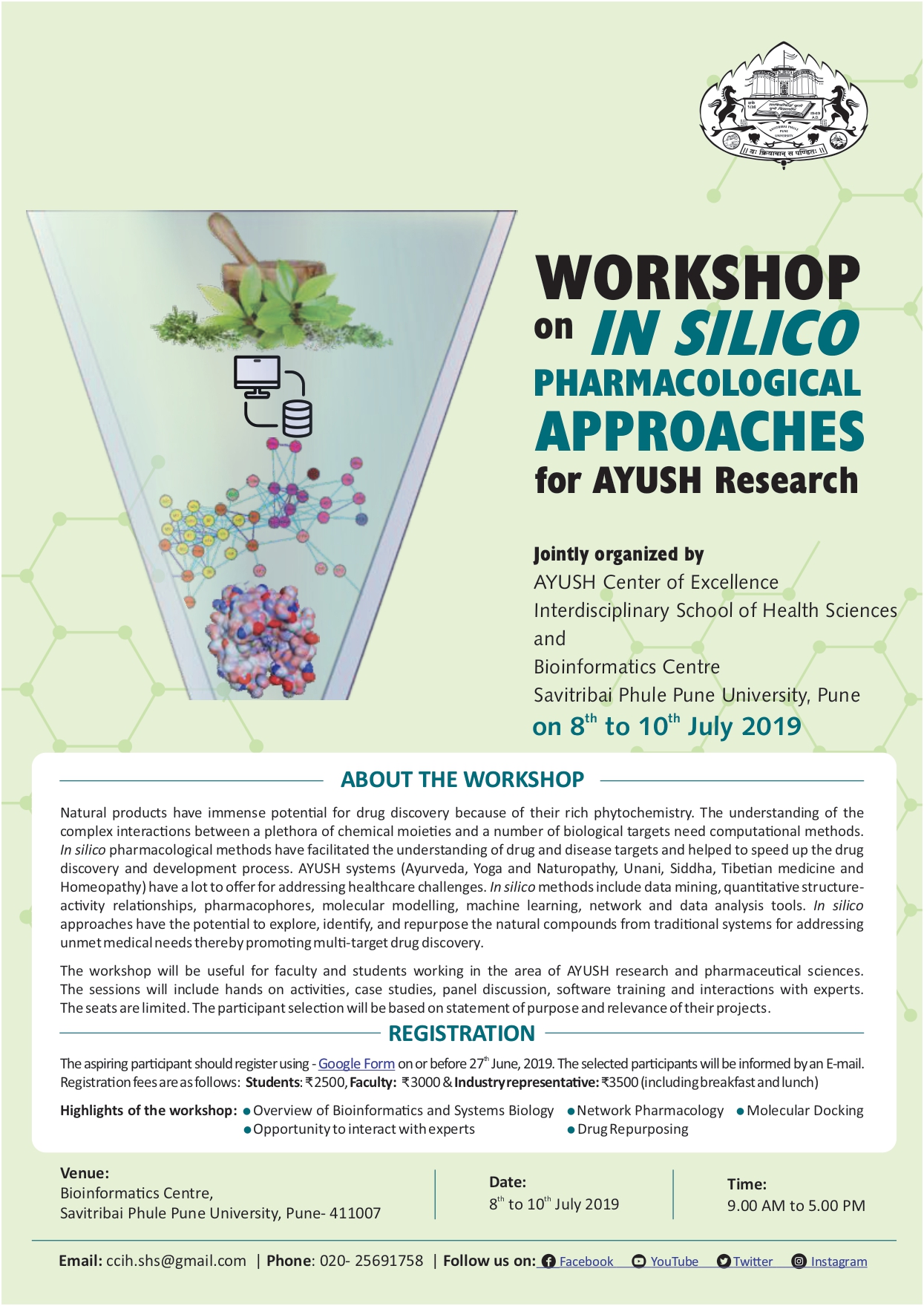
(5th - 6th July 2019)
The resolution of the United Nations General Assembly in 2014 reintroduced Yoga that significantly enhanced its awareness. The potentials of Yoga are globally recognized for improving health and well-being. The thought leaders and policy makers have proposed amalgamation of Yoga with other healing sciences transforming the healthcare scenario.
The Ramkumar Rathi Patanjali Yoga Chair and AYUSH Center of Excellence of Savitribai Phule Pune University organized this workshop. This workshop focused on recent trends in Yoga research and opportunities for future prospect. The sessions included interaction with renowned scientists, practical sessions on Yoga-based techniques and group activities on research skills.
(28th June 2019)
Meta-research is a study of research methods, reporting, reproducibility, evaluation, and incentives. It follows an interdisciplinary approach to ensure quality and robustness of science. A systematic review is one of the approaches used to summarize the results of research available on a particular topic or clinical question.
One day on-site workshop was conducted by Dr. Rahul Mhaskar, Associate Professor, Department of Internal Medicine, University of South Florida, USA. The workshop included an introduction to meta-research and systematic reviews. The workshop was organised for postgraduate faculty and researchers from various disciplines like biomedicine, health sciences and AYUSH systems. The overview of meta-research approaches, the process of a systematic review, and the impact of meta-research were discussed in detail. The workshop also covered a session on reporting guidelines along with hands-on activity on appraisal of methodological quality, risk of bias papers, and information from clinical trials using data extraction form.
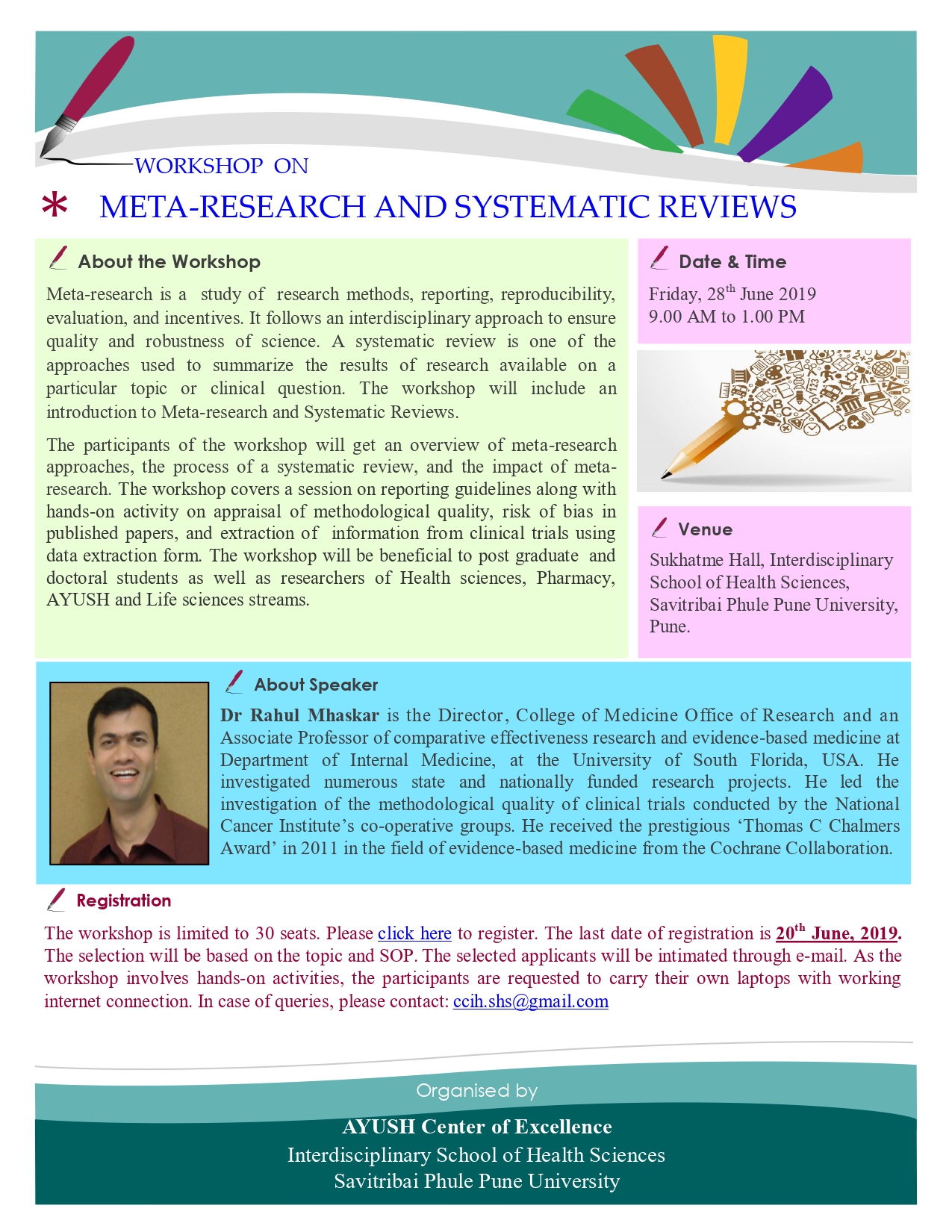
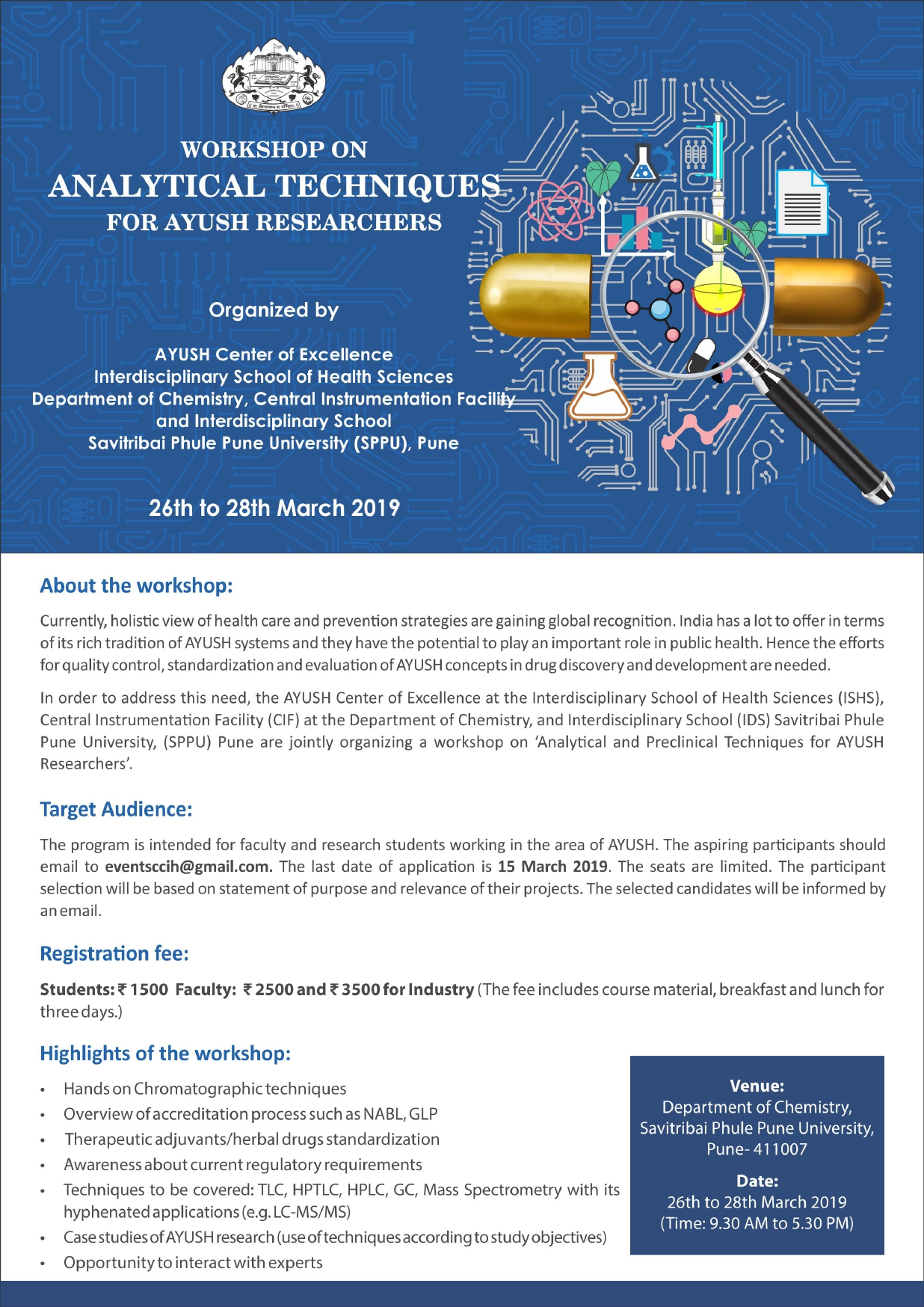
(26th - 28th March 2019)
Currently, the holistic view of health care and prevention strategies are gaining global recognition. India has a lot to offer in terms of its rich tradition of AYUSH systems and they have potential to play an important role in public health. Hence, the efforts for quality control, standardization, and evaluation of AYUSH concepts in drug discovery and development are needed.
In order to address this need, the AYUSH Center of Excellence, Department of Health Sciences and Central Instrumentation Facility, Department of Chemistry of Savitribai Phule Pune University jointly organized this workshop. The three-day workshop covered the hands-on chromatographic techniques including Thin Layer Chromatography (TLC), various Mass Spectrometry (MS) based technologies (e.g. HPTLC-MS/MS, HPTLC-NMR, LCMS, LC/MS/MS, LC-NMR, etc.), overview of accreditation processes as NABL and GLP, therapeutic adjuvants, herbal drugs standardization and case studies of AYUSH research.
(22nd February 2019)
The National Health Policy (NHP) 2017 has emphasized on mainstreaming the potential of the AYUSH system. NHP also suggests research capacity building of AYUSH clinicians. The AYUSH Center of Excellence, Department of Health Sciences of Savitribai Phule Pune University along with Indian Anthropology Congress, and Society for Indian Medical Anthropology jointly organised this workshop to share and translate best practices in public health systems.
The workshop focused on implementation of AYUSH concepts for addressing public health challenges. The topics covered were a blend of clinical practice and research methods that cater to the needs of medical officers, clinicians, and public health researchers.
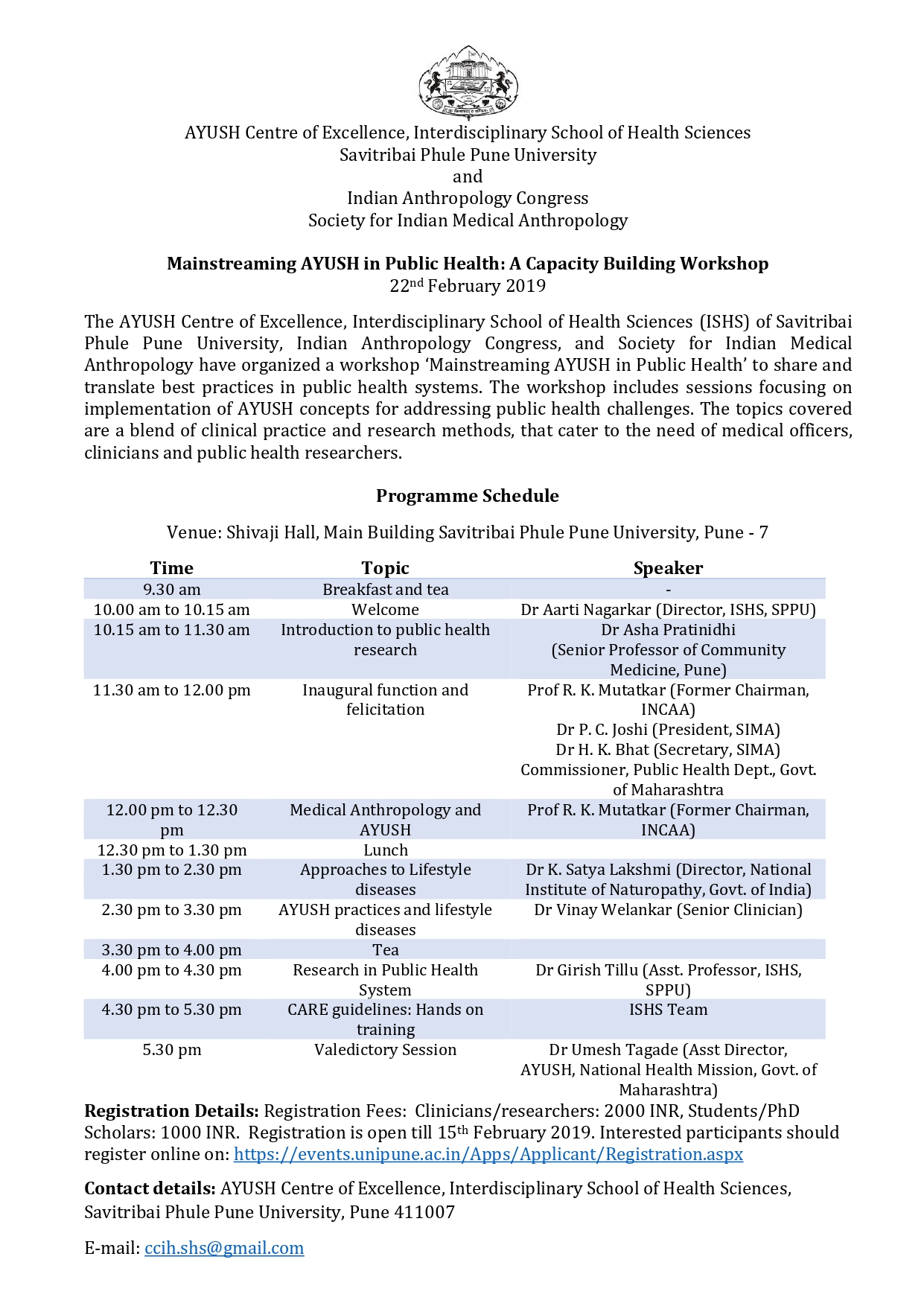
(19th January 2019)
National Accreditation Board for Testing and Calibration Laboratories (NABL) is a constituent board of the Quality Council of India. NABL has been established with the objective to provide government, industry associations, and industry in general with a scheme for third-party assessment of the quality and technical competence of testing and calibration laboratories. Therefore, the awareness workshop was jointly organized by the AYUSH Center of Excellence, Department of Health Sciences and Central Instrumentation Facilities (CIF) of Savitribai Phule Pune University.
This workshop mainly focused on creating awareness about NABL guidelines. Mr. S. A. Kukade, Former Director, Electronics Test and Development Centre and Centre for Electronics Test Engineering, Pune was the main resource person for this workshop. He is an experienced lead auditor for ISO 9001, ISO/IEC 17025 lab accreditation system.
(15th November- 14th December 2018)
A training workshop supported by the Department of Health Research (DHR), Ministry of Health and Family Welfare, Government of India, aimed at taking the learning forward and expanding the scope of training to biomedical researchers and teachers of AYUSH systems. The host institute, the Department of Health Sciences, Savitribai Phule Pune University (SPPU), shared insights to strengthen the research capability by integrating knowledge from traditional and modern medical systems with all the participants. A fellowship is termed as the ‘DHR Winter School’ on transdisciplinary research for integrative health. This workshop addressed the training needed in Traditional Medicine and Integrative Health through a short-term fellowship program. The program included a fellowship to 30 AYUSH systems and biomedical sciences teachers.
This workshop mainly focused on creating awareness about NABL guidelines. Mr. S. A. Kukade, Former Director, Electronics Test and Development Centre and Centre for Electronics Test Engineering, Pune was the main resource person for this workshop. He is an experienced lead auditor for ISO 9001, ISO/IEC 17025 lab accreditation system.
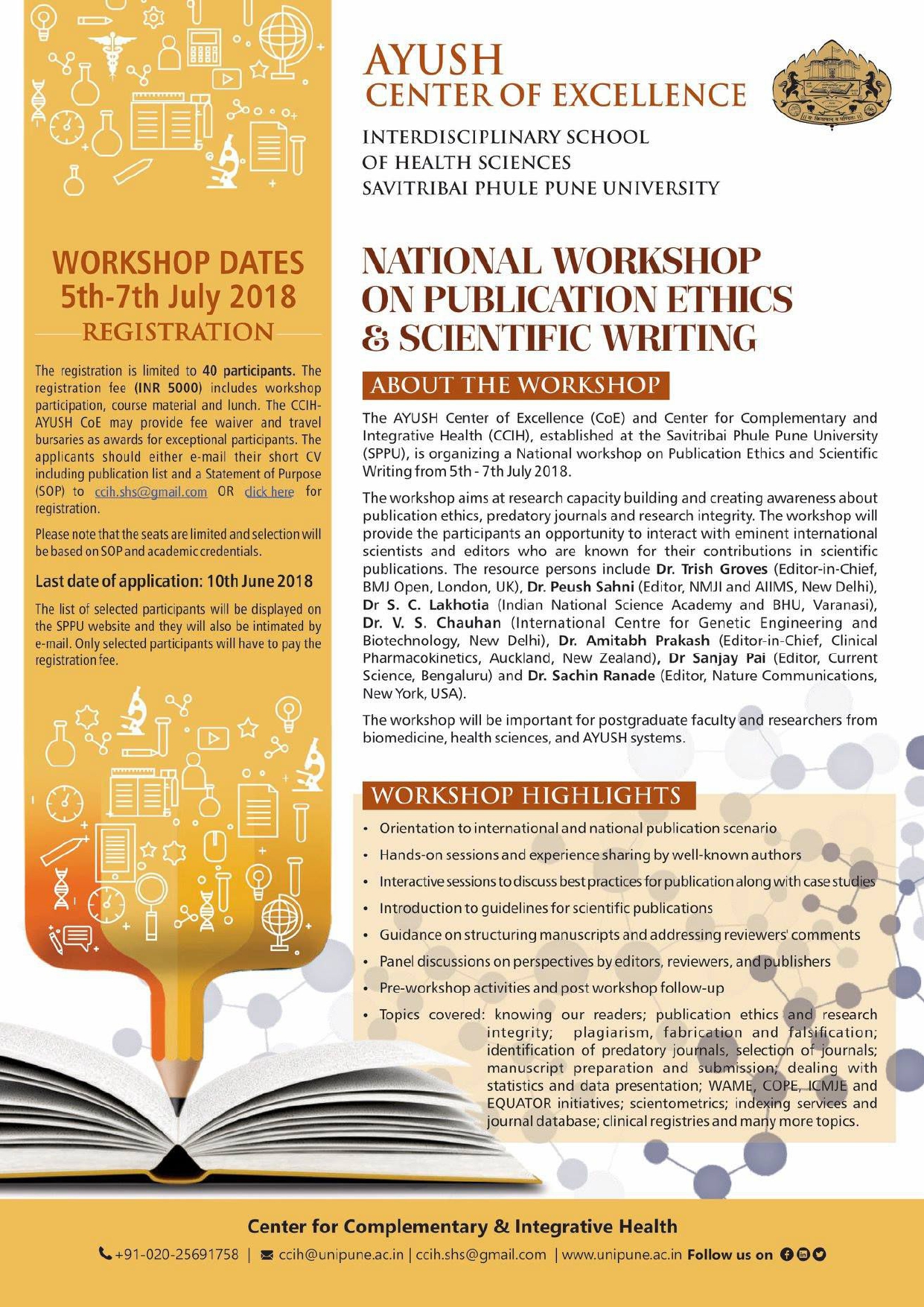
(5th - 7th July 2018)
The workshop focused on awareness about publication ethics, predatory journals, and research integrity. It provided the participants with an opportunity to learn and interact with eminent international scientists and editors known for their contributions in scientific publications.
Various important topics viz. publication ethics and research integrity, plagiarism, fabrication and falsification, identification of predatory journals, selection of journals, manuscript preparation and submission, dealing with statistics and data presentation, WAME, COPE, ICMJE and EQUATOR initiatives, scientometrics, indexing services and journal database; clinical registries were covered in the workshop.
(17th March 2018)
Transdisciplinary Research is an approach to curriculum integration which dissolves the boundaries between the conventional disciplines. It aims to develop collaborative networks to strengthen interdisciplinary research.
The workshop was focused on epistemology-relevant research methodologies based on AYUSH knowledge systems along with development of protocols from research ideas. Experts from various disciplines guided for innovative project development in collaboration with different fields. The workshop aimed at learning and understanding best practices related to postgraduate research and training thoroughly. An on-site workshop was divided into three sessions. The 1st session was based on case studies of transdisciplinary research and capacity building. In the 2nd session, participants interacted with resource persons followed by the 3rd session of panel discussion.
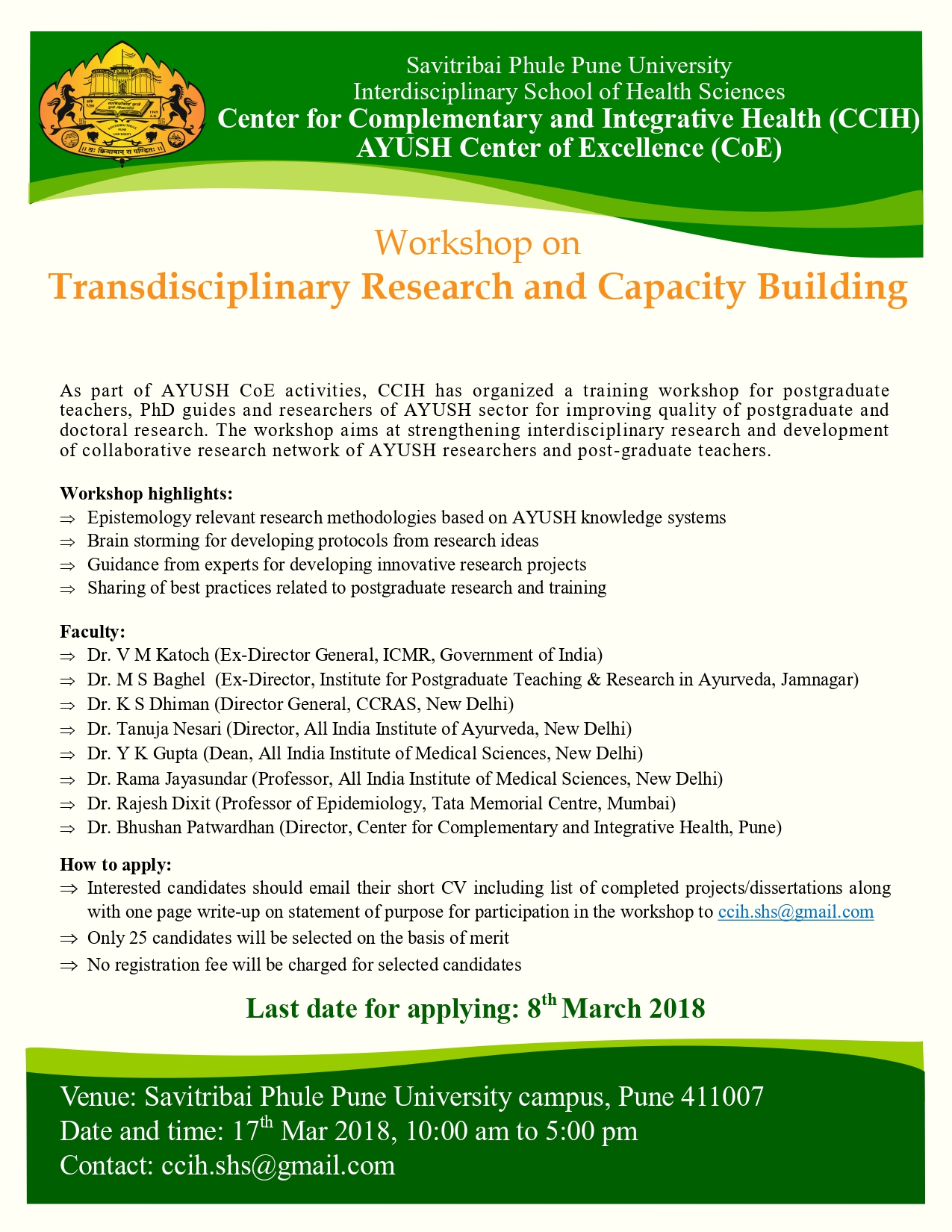
Copyright © Savitribai Phule Pune University, School of Health Sciences, Pune. All Rights Reserved.
[Best viewed in IE 10+, Firefox, Chrome, Safari, Opera.]
:::| powered by dimakh consultants |:::